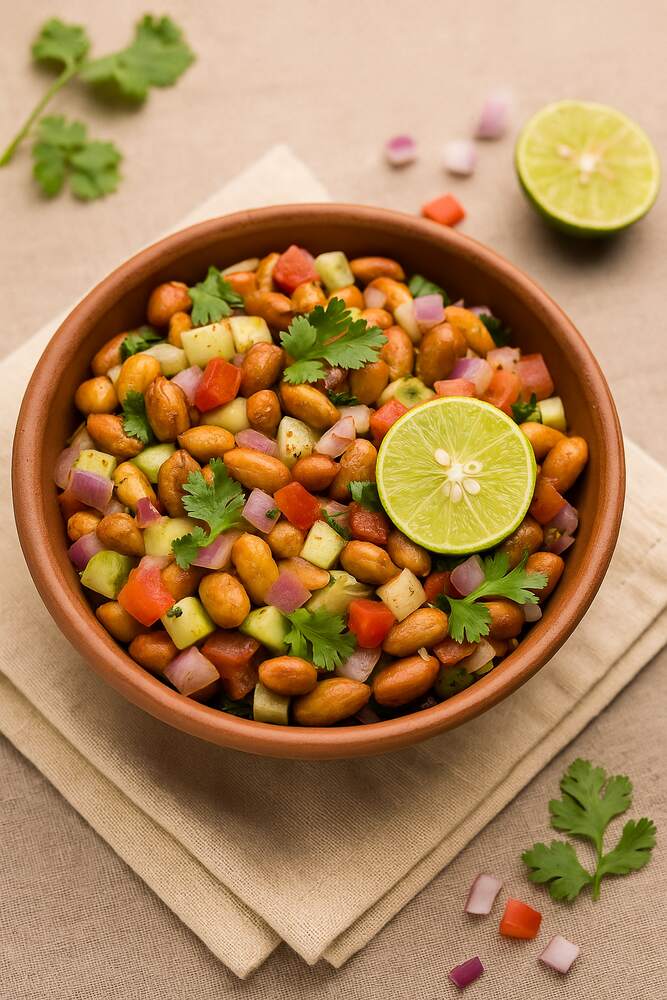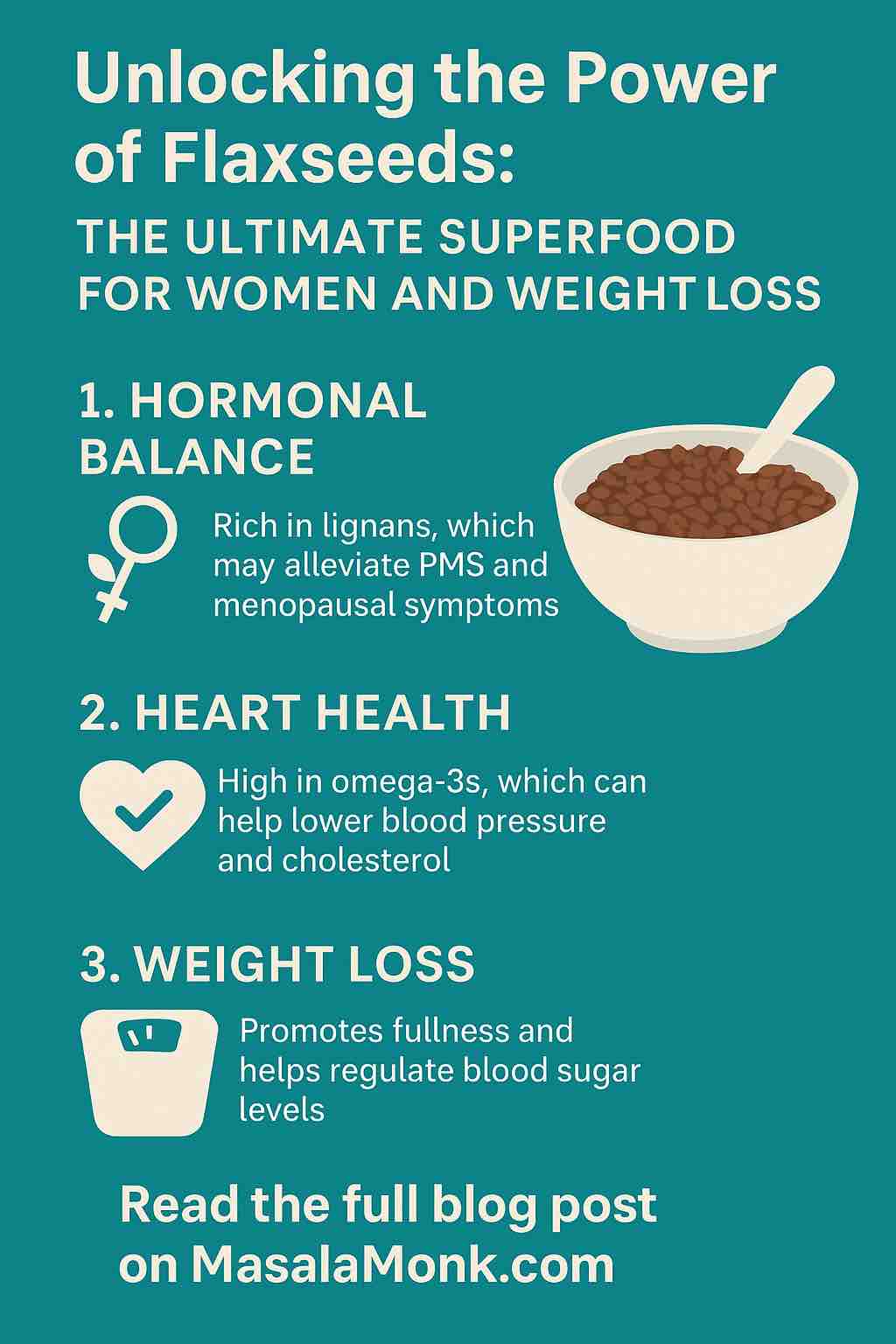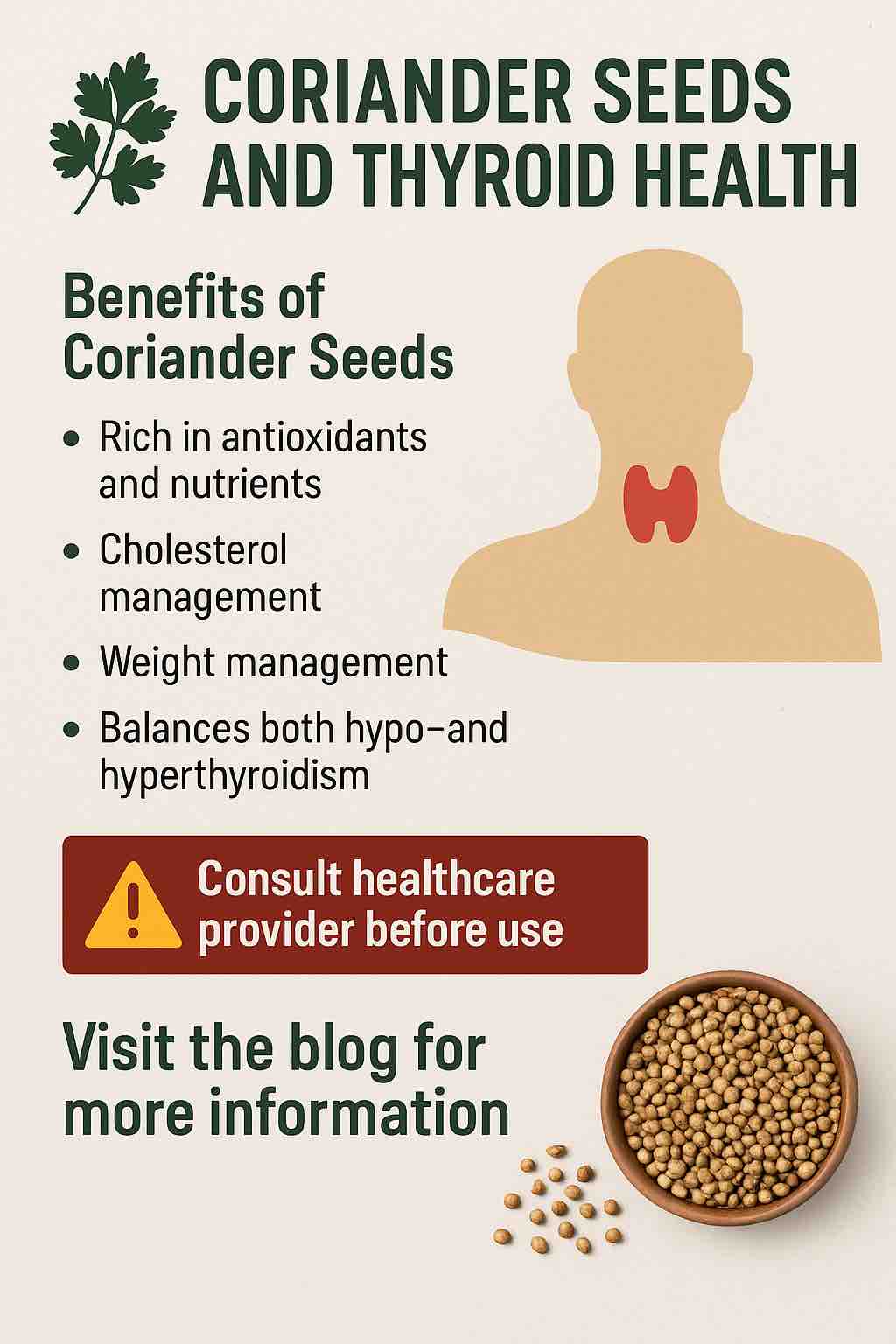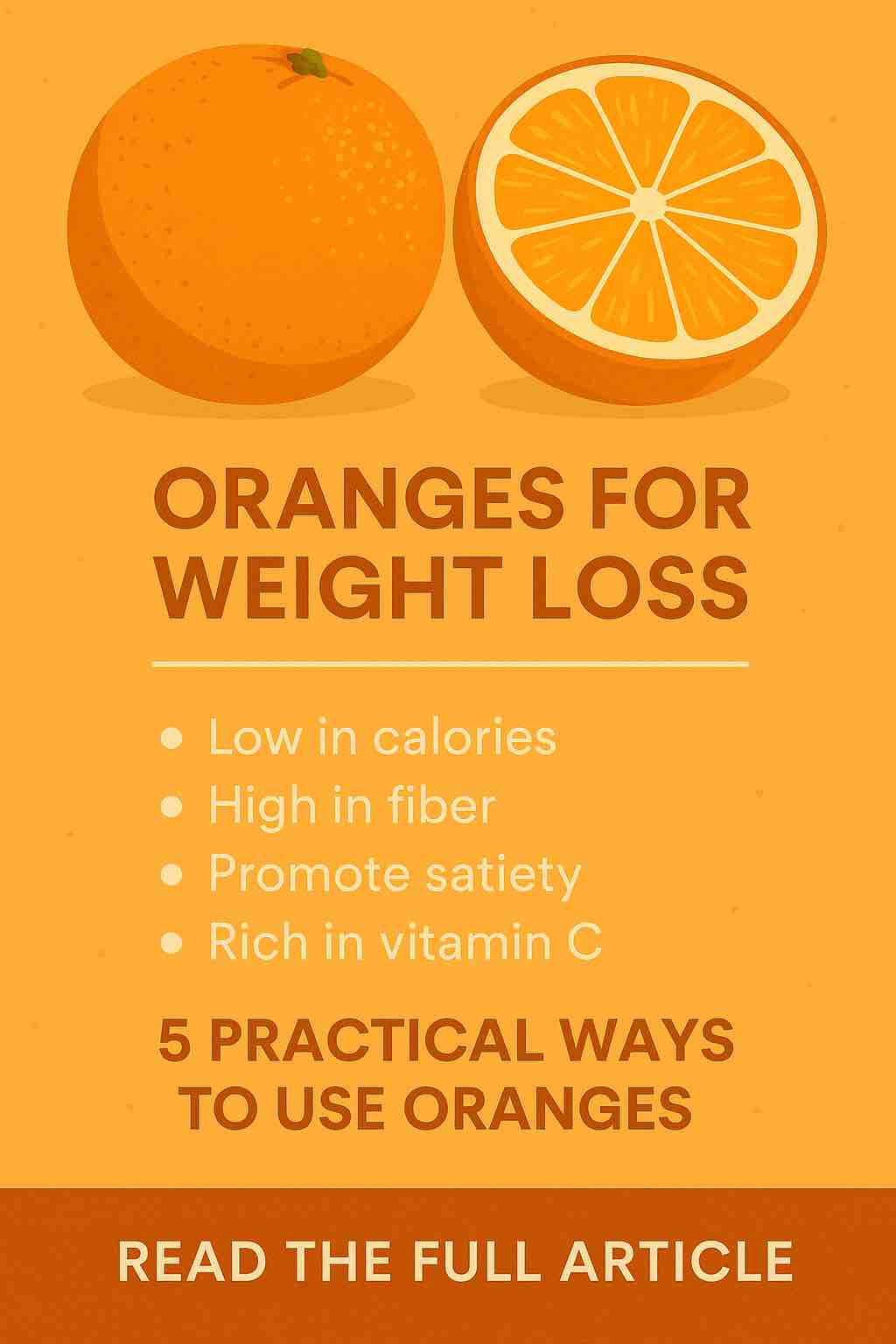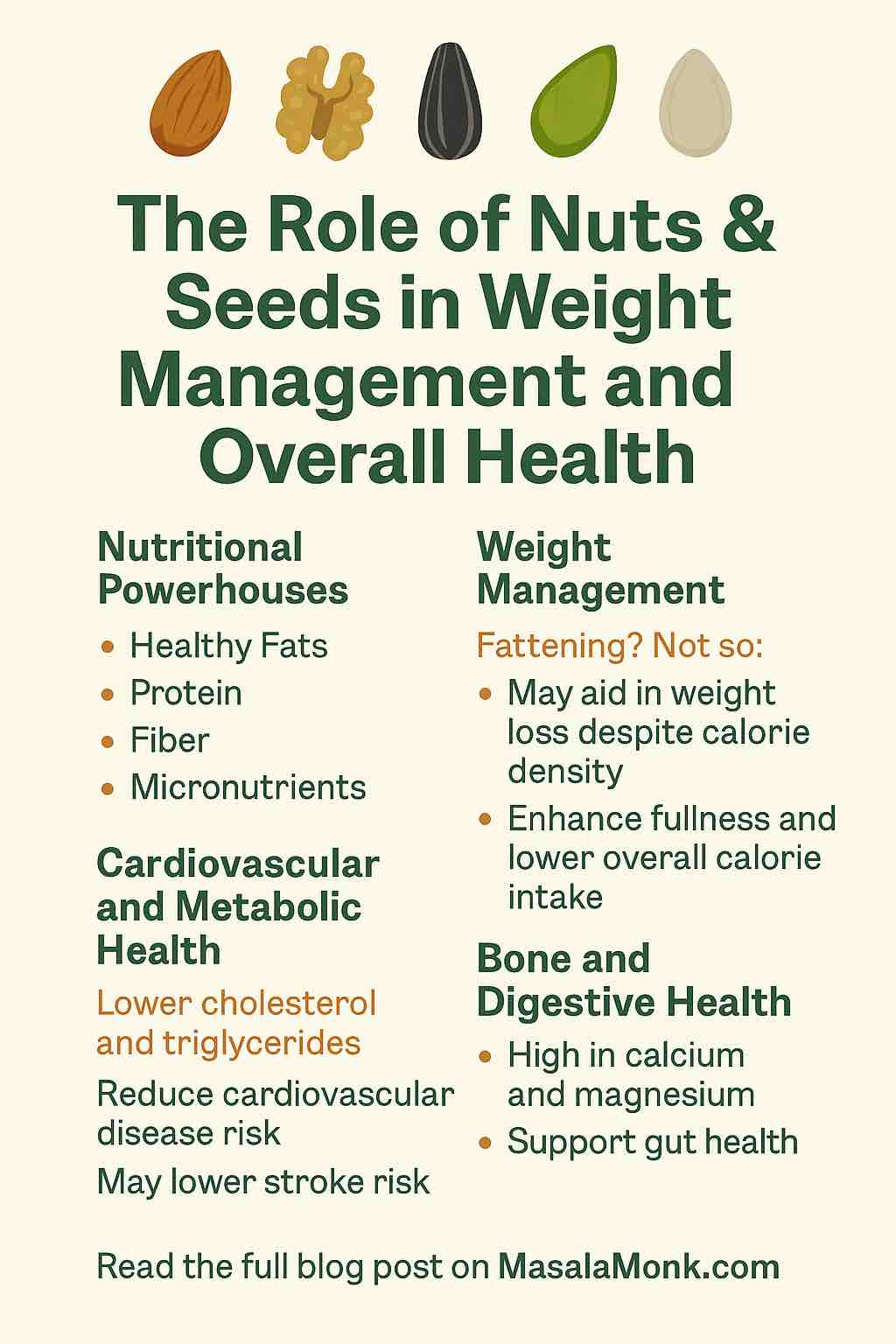
In today’s health-conscious world, the interest in plant-based, whole-food nutrition is rapidly growing. As chronic conditions like obesity, cardiovascular disease, and diabetes continue to rise globally, more people are turning to nature for preventive solutions. Among nature’s most powerful yet often underestimated health allies are nuts and seeds. Despite their small size and high fat content, they offer a symphony of nutrients that support weight control, metabolic health, and overall well-being. Let’s dive into the science and explore why these tiny nutritional powerhouses deserve a daily spot on your plate.
The Nutritional Brilliance of Nuts and Seeds
At first glance, nuts and seeds may appear deceptively simple, but they are biologically designed to fuel new life—meaning they are packed with concentrated nutrients.
Macronutrient Composition:
- Healthy Fats: Primarily monounsaturated and polyunsaturated fats (MUFA & PUFA), which reduce bad cholesterol and inflammation.
- Protein: An excellent plant-based protein source, aiding muscle repair and metabolic balance.
- Fiber: Essential for satiety, digestion, and blood sugar control.
Micronutrient & Phytochemical Richness:
- Vitamins & Minerals: Including vitamin E, magnesium, selenium, calcium, zinc, and B vitamins.
- Phytochemicals: Plant sterols, polyphenols, flavonoids, and antioxidants that fight oxidative stress and inflammation.
| Nut/Seed | Key Nutrients |
|---|---|
| Almonds | Vitamin E, magnesium, riboflavin, fiber |
| Walnuts | ALA (Omega-3), polyphenols, melatonin |
| Chia Seeds | Fiber, ALA, calcium, antioxidants |
| Flaxseeds | Lignans, ALA, fiber, iron |
| Pumpkin Seeds | Magnesium, zinc, protein, tryptophan |
| Sunflower Seeds | Vitamin E, selenium, phytosterols |
The Paradox of Fat-Rich Foods: Weight Management Reconsidered
One of the biggest misconceptions about nuts and seeds is that their high fat content leads to weight gain. However, modern research tells a different story.
1. Satiety and Appetite Control
Nuts and seeds contain protein, fiber, and fat—a trio that slows digestion and promotes long-lasting fullness. Studies show that adding nuts to meals can reduce overall calorie intake by naturally curbing hunger.
2. Lower Bioavailable Calories
Not all the calories in nuts are absorbed. Due to their cellular structure, some of the fat remains trapped in the fibrous matrix and is excreted. For instance, studies on almonds show actual energy absorption is about 25% lower than what’s estimated on labels.
3. Thermogenesis and Fat Oxidation
The metabolic effect of digesting nuts induces thermogenesis—calories burned during digestion. Some research indicates an increase in resting energy expenditure after nut consumption.
4. Clinical Evidence on Weight Trends
Numerous studies and meta-analyses (including those from the PREDIMED trial) show that individuals who consume nuts regularly are less likely to gain weight over time. In some trials, participants on nut-enriched diets lost significantly more weight than those avoiding them.
Cardiometabolic Health: More Than Just Weight
Beyond weight control, nuts and seeds wield powerful benefits for heart and metabolic health:
- Cholesterol Management: Walnuts and almonds are proven to lower LDL cholesterol and total cholesterol.
- Blood Pressure Regulation: Seeds like flax and chia help in lowering blood pressure through their anti-inflammatory and vasodilatory properties.
- Insulin Sensitivity: Several nuts improve insulin response, reduce fasting blood sugar, and support glycemic control.
- Triglyceride Reduction: Chia and flaxseeds, thanks to their omega-3 content, effectively lower triglycerides.
Studies show that diets rich in nuts and seeds can reduce the risk of cardiovascular disease by up to 30% and lower the incidence of type 2 diabetes by 8-10%.
Digestive and Gut Health: Feeding Your Microbiome
The fiber content and polyphenols in nuts and seeds serve as prebiotics, fueling beneficial gut bacteria:
- Increased Butyrate Production: Beneficial short-chain fatty acids that support gut lining integrity.
- Microbiome Diversity: Regular consumption has been linked with improved microbial diversity, essential for immune and metabolic health.
Seeds like flax and chia also offer mucilage—a gel-like fiber that eases bowel movements and supports colon health.
Brain and Cognitive Benefits: A Nutritional Edge
- Neuroprotective Fats: Omega-3s from walnuts, flax, and chia support brain membrane integrity and reduce inflammation.
- Antioxidants: Polyphenols in nuts combat oxidative stress, a key factor in cognitive decline.
- Mood Support: Magnesium and tryptophan (abundant in pumpkin seeds) help regulate neurotransmitters like serotonin.
Emerging evidence also links regular nut intake with better memory performance and reduced risk of Alzheimer’s disease.
Practical Integration into Daily Diets
To maximize benefits:
- Portion Size: 1 ounce (28g) per day is optimal for most adults.
- Form Matters: Choose raw or dry-roasted over sugar-coated or heavily salted varieties.
- Meal Integration:
- Sprinkle chia or flax into smoothies or oats.
- Add sunflower or pumpkin seeds to salads.
- Enjoy a handful of almonds or walnuts as a snack.
- Make nut butters or trail mixes for convenience.
Precautions and Considerations
- Allergies: Tree nut and peanut allergies can be severe. Seeds are often safer alternatives.
- Antinutrients: Phytates and oxalates can impair mineral absorption. Soaking, sprouting, or roasting reduces these.
- Caloric Awareness: While they support weight loss, portion control is crucial due to their calorie density.
Looking Ahead: Future Research and Policy Implications
As more evidence mounts, dietary guidelines may shift to explicitly promote nut and seed consumption. Emerging research is examining:
- Impact on the gut-brain axis
- Nut consumption in pediatric populations
- Processing effects on nutrient bioavailability
- Policy integration: Calls to revise food labeling systems to better reflect their health benefits
Conclusion: Small Seeds, Big Impact
Nuts and seeds are no longer just snack options or smoothie toppings. They are clinically backed, nutrient-rich components of a well-rounded diet. Their unique combination of fats, fiber, protein, micronutrients, and phytochemicals supports not only weight management but also heart, brain, and gut health.
In a world where chronic disease prevention is more urgent than ever, integrating these tiny titans into your daily nutrition is one of the simplest, most powerful steps you can take for long-term wellness. So go ahead—grab a handful, and let nature work its magic.
Author’s Note: Always consult a healthcare provider or dietitian before making significant dietary changes, especially if you have allergies or chronic health conditions.
✅ FAQs: Nuts & Seeds for Weight Management and Health
1. Are nuts and seeds fattening?
No. Despite their high fat content, studies show that regular consumption of nuts and seeds does not lead to weight gain. Their protein, fiber, and healthy fats promote satiety, which may help reduce overall calorie intake.
2. How much should I eat per day?
A standard portion is about 1 ounce (28–30g) of mixed nuts or seeds daily. This amount provides health benefits without significantly increasing calorie intake.
3. Which nuts and seeds are best for heart health?
Walnuts (rich in ALA omega-3), almonds (high in vitamin E), and flax/chia seeds (for lowering LDL and triglycerides) are especially heart-friendly.
4. Can I eat nuts and seeds if I’m trying to lose weight?
Yes. Studies show that people who include nuts in calorie-controlled diets often lose more weight than those who avoid them, due to enhanced satiety and fat malabsorption.
5. What’s the best time to eat nuts or seeds?
Anytime. They make a great mid-morning or afternoon snack, or can be added to meals (e.g., breakfast oats, salads, yogurt) to enhance nutrition and satiety.
6. Are raw nuts better than roasted or salted ones?
Raw or dry-roasted, unsalted nuts and seeds are healthiest. Avoid varieties coated in sugar, excessive salt, or processed oils.
7. Can nuts and seeds improve digestion?
Yes. Their fiber content promotes bowel regularity and supports beneficial gut bacteria. Flax and chia also provide mucilage, aiding smooth digestion.
8. Are nuts safe for people with high cholesterol?
Absolutely. Regular consumption of almonds, walnuts, pistachios, and flaxseeds has been shown to reduce LDL cholesterol and improve lipid profiles.
9. Do I need to soak nuts and seeds before eating?
Soaking can reduce antinutrients like phytic acid, improving mineral absorption. While not necessary for everyone, it’s helpful for those with digestive sensitivities.
10. What are good alternatives for people with nut allergies?
Seeds (sunflower, pumpkin, chia, flax) are generally safe and provide similar benefits. Always check with a healthcare provider if allergies are a concern.

